阅读教程四 重要文章
阅读教程第四册 课件Unit+3
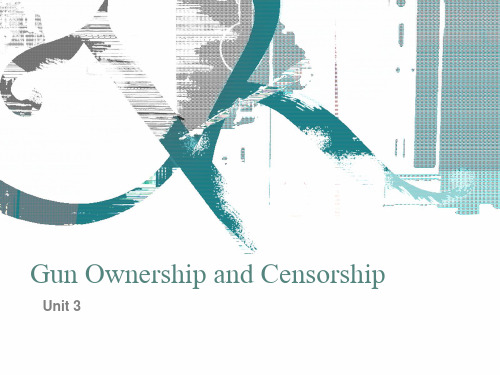
• The attacks received international media coverage and drew widespread criticism of U.S. laws and culture. It sparked intense debate about gun violencfor treating mental health issues, the perpetrator's state of mind, the responsibility of college administrations, privacy laws, journalism ethics, and other issues. Television news organizations that aired portions of the killer's multimedia manifesto were criticized by victims' families, Virginia law enforcement officials, and the American Psychiatric Association.
Virginia Tech massacre
• The Virginia Tech massacre was a school shooting that took place on Monday, April 16, 2007 on the campus of Virginia Tech in Blacksburg, Virginia. In two separate attacks, approximately two hours apart, the perpetrator, Seung-Hui Cho, killed 32 people and wounded many others before committing suicide. The massacre is the deadliest peacetime shooting incident by a single gunman in United States history, on or off a school campus.
新世纪阅读教程4答案
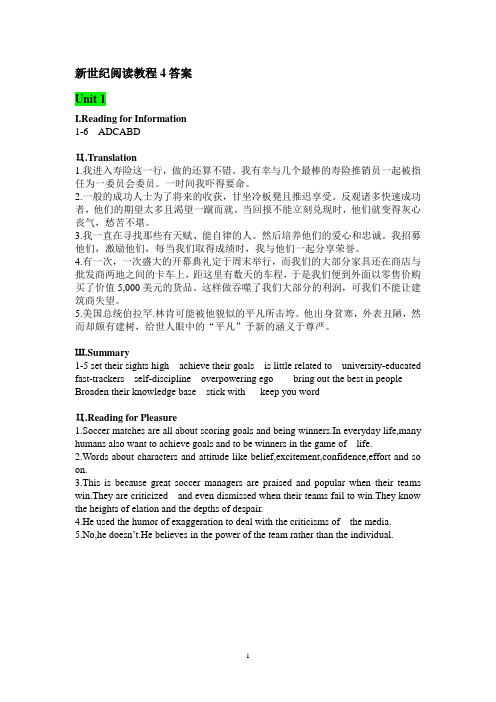
新世纪阅读教程4答案Unit 1I.Reading for Information1-6 ADCABDЦ.Translation1.我进入寿险这一行,做的还算不错。
我有幸与几个最棒的寿险推销员一起被指任为一委员会委员。
一时间我吓得要命。
2.一般的成功人士为了将来的收获,甘坐冷板凳且推迟享受。
反观诸多快速成功者,他们的期望太多且渴望一蹴而就。
当回报不能立刻兑现时,他们就变得灰心丧气,愁苦不堪。
3.我一直在寻找那些有天赋、能自律的人。
然后培养他们的爱心和忠诚。
我招募他们,激励他们,每当我们取得成绩时,我与他们一起分享荣誉。
4.有一次,一次盛大的开幕典礼定于周末举行,而我们的大部分家具还在商店与批发商两地之间的卡车上,距这里有数天的车程,于是我们便到外面以零售价购买了价值5,000美元的货品。
这样做吞噬了我们大部分的利润,可我们不能让建筑商失望。
5.美国总统伯拉罕.林肯可能被他貌似的平凡所击垮。
他出身贫寒,外表丑陋,然而却颇有建树,给世人眼中的“平凡”予新的涵义于尊严。
Ш.Summary1-5 set their sights high achieve their goals is little related to university-educated fast-trackers self-discipline overpowering ego bring out the best in people Broaden their knowledge base stick with keep you wordЦ.Reading for Pleasure1.Soccer matches are all about scoring goals and being winners.In everyday life,many humans also want to achieve goals and to be winners in the game of life.2.Words about characters and attitude like belief,excitement,confidence,effort and so on.3.This is because great soccer managers are praised and popular when their teams win.They are criticized and even dismissed when their teams fail to win.They know the heights of elation and the depths of despair.4.He used the humor of exaggeration to deal with the criticisms of the media.5.No,he doesn’t.He believes in the power of the team rather than the individual.Unit2I.Reading for Information1-6.CBDABCЦ.Translation1.等等!我不管谁把那块馅饼切成两块,但无论谁切,都得给另一方挑选的权力。
新世纪大学英语阅读教程4(第二版) U1 Part1+Part2 文章翻译
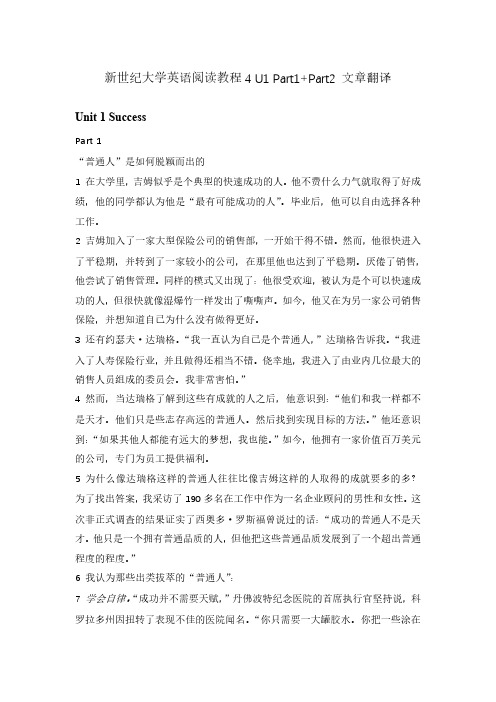
新世纪大学英语阅读教程4 U1 Part1+Part2 文章翻译Unit 1 SuccessPart 1“普通人”是如何脱颖而出的1 在大学里,吉姆似乎是个典型的快速成功的人。
他不费什么力气就取得了好成绩,他的同学都认为他是“最有可能成功的人”。
毕业后,他可以自由选择各种工作。
2 吉姆加入了一家大型保险公司的销售部,一开始干得不错。
然而,他很快进入了平稳期,并转到了一家较小的公司,在那里他也达到了平稳期。
厌倦了销售,他尝试了销售管理。
同样的模式又出现了:他很受欢迎,被认为是个可以快速成功的人,但很快就像湿爆竹一样发出了嘶嘶声。
如今,他又在为另一家公司销售保险,并想知道自己为什么没有做得更好。
3 还有约瑟夫·达瑞格。
“我一直认为自己是个普通人,”达瑞格告诉我。
“我进入了人寿保险行业,并且做得还相当不错。
侥幸地,我进入了由业内几位最大的销售人员组成的委员会。
我非常害怕。
”4 然而,当达瑞格了解到这些有成就的人之后,他意识到:“他们和我一样都不是天才。
他们只是些志存高远的普通人。
然后找到实现目标的方法。
”他还意识到:“如果其他人都能有远大的梦想,我也能。
”如今,他拥有一家价值百万美元的公司,专门为员工提供福利。
5 为什么像达瑞格这样的普通人往往比像吉姆这样的人取得的成就要多的多?为了找出答案,我采访了190多名在工作中作为一名企业顾问的男性和女性。
这次非正式调查的结果证实了西奥多·罗斯福曾说过的话:“成功的普通人不是天才。
他只是一个拥有普通品质的人,但他把这些普通品质发展到了一个超出普通程度的程度。
”6 我认为那些出类拔萃的“普通人”:7 学会自律。
“成功并不需要天赋,”丹佛波特纪念医院的首席执行官坚持说,科罗拉多州因扭转了表现不佳的医院闻名。
“你只需要一大罐胶水。
你把一些涂在椅子上,一些涂在裤子上,然后坐下来,坚持做每一个项目,直到你做到你能做到的最好。
”8 普通的成功人士总是粘在椅子上,推迟快乐,收获未来的回报。
阅读阅读教程第四册_课件_Unit_4
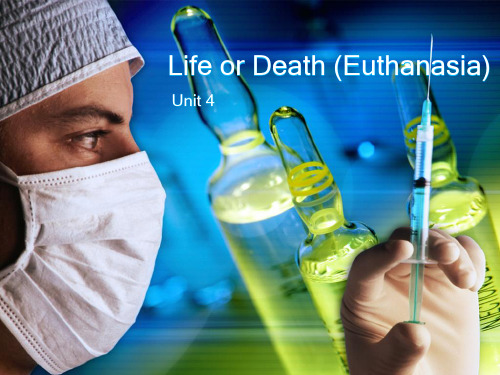
• Title: what the narrator has done led to the death of a patient which is deemed as a crime by the public who hold the traditional morality. But the motivation of so-called “crime” comes from the narrator‟s compassion for the patient. “Compassion”, a kind-hearted and good-natured affection, contradicts with “crime”, an evil behavior. The contrast arouses the interest of the readers. • Para.4 • “Otherwise, he felt great.” • He had nothing wrong but somntary euthanasia • Euthanasia conducted with the consent of the patient is termed voluntary euthanasia. Voluntary euthanasia is legal in Belgium, Luxembourg, the Netherlands, Switzerland, and the U.S. states of Oregon and Washington. When the patient brings about his or her own death with the assistance of a physician, the term assisted suicide is often used instead. • Non-voluntary euthanasia • Euthanasia conducted where the consent of the patient is unavailable is termed non-voluntary euthanasia. Examples include child euthanasia, which is illegal worldwide but decriminalised under certain specific circumstances in the Netherlands under the Groningen Protocol. • Involuntary euthanasia • Euthanasia conducted against the will of the patient is termed involuntary euthanasia.
阅读教程4文章翻译
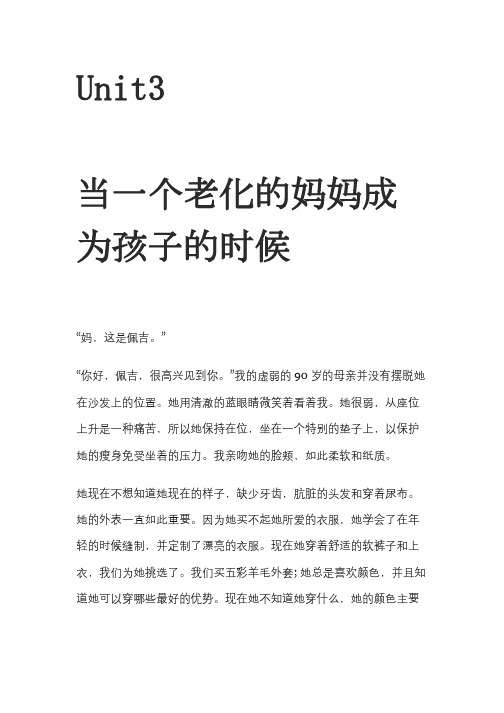
Unit3当一个老化的妈妈成为孩子的时候“妈,这是佩吉。
”“你好,佩吉,很高兴见到你。
”我的虚弱的90岁的母亲并没有摆脱她在沙发上的位置。
她用清澈的蓝眼睛微笑着看着我。
她很弱,从座位上升是一种痛苦,所以她保持在位,坐在一个特别的垫子上,以保护她的瘦身免受坐着的压力。
我亲吻她的脸颊,如此柔软和纸质。
她现在不想知道她现在的样子,缺少牙齿,肮脏的头发和穿着尿布。
她的外表一直如此重要。
因为她买不起她所爱的衣服,她学会了在年轻的时候缝制,并定制了漂亮的衣服。
现在她穿着舒适的软裤子和上衣,我们为她挑选了。
我们买五彩羊毛外套; 她总是喜欢颜色,并且知道她可以穿哪些最好的优势。
现在她不知道她穿什么,她的颜色主要是为了我们,她的孩子,以及在设施里照顾她的人,他们是晚期痴呆症的人。
她是员工的最爱,好甜心分享,小心别人的感受。
明年9月初,这是明天清脆的一天,明尼苏达州是典型的一天:湿度低,蔚蓝的天空。
我谈论当天的可爱,鼓励她和我坐在外面。
她同意,就像我对我的任何建议一样。
她现在是一种不同的母亲,不再是老板,而是孩子。
我们慢慢走过她三年过去的这座建筑的中央会议室。
它分为四个“家”。
像她一样,分享她的生活区的另外七个痴呆患者都爱着不能再照顾的人。
从我们小时候,妈妈警告我们,当她老了,她永远不会强加给我们。
在大萧条的深处,她和一家四口姐姐,母亲和父亲住在一起的一位老人亲自离开卧室,她从未忘记过。
爸爸被迫在这里犯了她他是同样的年龄,身体健康,他不能再照顾她了。
当他还活着的时候,他们一直看到对方。
他会从旁边的辅助生活楼走过来。
他现在已经走了两年。
她真正的家,她丈夫65岁,她的孩子,她的职业,她的爱好和技能,甚至是绿色的拇指- 这些都已经从她的生活中消失了。
她不记得她是家庭教师,八岁的母亲,有一个崇拜的丈夫; 她可以生长任何东西,可以精美地缝制,总是穿着无可挑剔,不关心娱乐。
我住在巴尔的摩一千里,我每三个月拜访她一次。
这样的访问意味着我每次访问都会看到她的记忆中有明确的变化。
大学英语阅读教程Reading 4
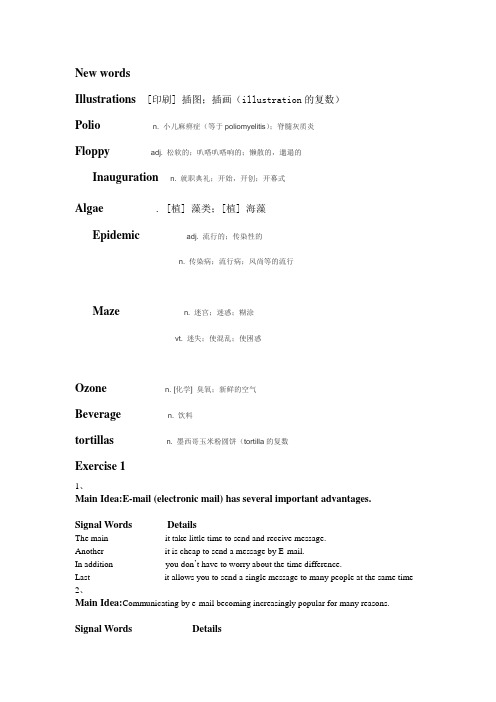
New wordsIllustrations [印刷] 插图;插画(illustration的复数)Polio n. 小儿麻痹症(等于poliomyelitis);脊髓灰质炎Floppy adj. 松软的;叭嗒叭嗒响的;懒散的,邋遢的Inauguration n. 就职典礼;开始,开创;开幕式Algae . [植] 藻类;[植] 海藻Epidemic adj. 流行的;传染性的n. 传染病;流行病;风尚等的流行Maze n. 迷宫;迷惑;糊涂vt. 迷失;使混乱;使困惑Ozone n. [化学] 臭氧;新鲜的空气Beverage n. 饮料tortillas n. 墨西哥玉米粉圆饼(tortilla的复数Exercise 11、Main Idea:E-mail (electronic mail) has several important advantages.Signal Words DetailsThe main it take little time to send and receive message.Another it is cheap to send a message by E-mail.In addition you don’t have to worry about the time difference.Last it allows you to send a single message to many people at the same time 2、Main Idea:Communicating by e-mail becoming increasingly popular for many reasons. Signal Words DetailsFirst people who do not like to use the telephone like to use e-mail. Second it is useful for sending suggestions or requests.Furthermore e-mail message are uniform.In addition they do not give away the sender’s feelings or emotional condition 3、Main Idea:An advertising executive recently described the many ways that e-mail helps her do her job.Signal Words DetailsFirst she uses e-mail for communicating with her employees.In addition her employees no longer have to do all of their work in the office And when the advertising company wants to contact a large number ofclients,a single e-mail message is sent to them.Exercise 21、Main Idea:Iceland is not a place for the ordinary tourist.Signal Words DetailsThe landscape the landscape is bare and strang.The far northern climate the winter weather is severe,summer is short and cool,with strong wind The Remote location the Remote location means many products are expensive.2、Main Idea:there are a number of ways to make life more comfortable.Signal Words DetailsFor example you can try to keep your home as cool as possible.Also it is important to keep yourself cool.And finally you should try to stay calm and relaxed.Exercise 3A、Main Idea: Franklin D·Roosevelt served his country for most of his life.Signal Words DetailsJanuary 30,1882 he was...1903 he began his studies at Harvard.1905 he married Eleanor RooseveltDuring they had six childrenAfter he serred in the New York State Senate.1921 Mr.Roosevelt worked in Washington as Secretary of the Navy.At that time he become very ill with polio and lost the use of his legs.In 1928 Mr.Roosevelt ran for governor of New York.After he serred two terms as governor.In 1933 he was elected to the presidency in 1933.April 12,1945 president Roosevelt died in office on April 12,1945 .BMain Idea:using a digital camera and a computer is an easy and enjoyable way to get good photographs.Signal Words DetailsFirst install the .....Then take some pictureAfter that connect your camera to the computerNext open the program on the computer and save the pictureAt this point edit them as desiredThen save the edited photosFinally print themExercise 41、Main Idea:as Maya Angelou ,an African--American author,was growing up,she learned about abuse and hate,but also about love and support.Signal Words Details1929 she was born in Long Beach ,CaliforniaThree years old her parents separatedEight years old Maya was abused by her mother’s boyfriendThen she and her brother went to live with her grandmotherDuring her youth she also discovered her love of literatureIn 1945 Maya graduated from a high school in San FranciscoA few months later she had a baby sonIn later year Maya included all of these experiences in her novels,poemsIn 1993 she was invited to write the official poem for the inauguration of President Bill Clinton2、Main Idea:Spike lee an African--American film director,is one of the most noted people in his field.Signal Words DetailsIn 1957 he was born in Atlanta GeorgiaTwo years old his family moved to Brooklyn,New YorkAs a youngster his interest in movies beganAfter graduating he studies filmmaking at New York University from MorehouseCollegesSoon after that he made his first feature film,she’s gonna have itSince he has written ,produced,directed,more than fifteen filmsExercise 53 74 9 8 1 2 105 6Exercise 61Main Idea:if you get a blowout while you are driving ,what should you do.Signal Words DetailsFirst thing hold very tightly to the steering wheelNext step must not try to step or turn too quicklyAfter move over to the side road and slow down graduallyThen turn on your flashing lights2Main Idea:the early year of Hans Christian AndersenSignal Words DetailsBorn in 1805 in OdenseIn reality he was lonely and unhappy as a child,and desperately poor.In spite of he believed that he was special and that he deserved a better life At the age of fourteen he picked up his new things and went to Copen Hagan to seek hisfortune as a writerExercise 7Main idea statements3、Football5、Song ZuyingA、Main Idea: the similarities and differences of the New York subway and Paris’ subway Signal Words DetailsBoth depend on .......Both the subway are often crowdedAnother likeness terrible noise level in the trainsA further similarities two subway systems both caver a wide area at little expanse forcommuterHowever differences between the two are quite strikingWhile New York......On the other hand New York trains can sometimes be less clear and reliable B、Main Idea:the similarities of the Ukrainian and Japan is that they like to eat pastries filled with meatSimilaritiesSignal Words DetailsIn common the like to eat pastries filled with meatSimilar the Ukrainian pastries are called pilmeni and Japan pastries are calledgyozaBoth made of pastries of flat pastry foldedBoth people usually eat their pastries with sauceC、Main Idea: when the first baby arrives in a household everything changesdifferencesSignal Words DetailsBut in the .......But spent their evening o TV or reading /spent admiring their infantIn contrast their life is more carefully plannedWhile go out to see friends whenever they want/arrange for a babysitter Unlike neat and tidy rooms/full of baby thingsDifference the topic is always about the babyExercise 81Main Idea:The similarities between college and high schoolSimilaritiesSignal Words DetailsIn fact some important similarities between college and highschoolIn both places academic success depends on being a responsible studentLike the social situation in college is also like high schoolClosely resemble the activities in college also closely resemble the activities in highschool2Main Idea:The differences between the university of Bologna in northern Italy and most North American universityDifferenceSignal Words DetailsMajor difference it is the oldest University in EuropeOn the other hand ancient halls/relatively newAnother difference around the center of the city/no campus or special universityareaUnlike no trees or open spaces for students to meetInstead students meet on the streets,in cafes, and in the courtyards ofthe historic buildings3Main Idea:In Russia, there has always been a strong tradition of learning foreign languages BothSignal Words DetailsSame these schools have the same subjects as all Russian schoolHowever many of the subjects are taught in foreign languageDifferent students must be selected to attend specialized schoolsGreatest difference students learn to express themselves fluently in aforeign languageExercise 91Main Idea:the similarities between elephants and whales.Does this paragraph include similarities,differences,or both?Similarities Signal Words Detailsin fact They come from the same biological family.Similarities The shape of an elephant’s head is similar to awhale’sAnother similarities both animals are excellent swimmersLike They use sounds to show anger.Finally both female elephants and female whales stay close to otherfemales and help them when they give birth.2Main Idea:People usually build their houses out of the materials that are easily available to them.Does this paragraph include similarities,differences,or both?Differences Signal Words DetailsOther areas of Europe They build their houses of stone and brick.In tropical regions houses are made from plants that grow there. Coldest area people made their houses out of blocks of ice. Exercise 10Exercise 11AAIDS HIVEpidemics bacteriaCoughs colds and fluImproperly stored food food poisoningSlow infant development poor nutritionSkin cancer too much exposure to the sun Swimming in pools ear infectionHeart trouble diet high in fatLung cancer cigarette smokingSkiing broken legB1.AIDS result from HIV2.Improperly stored food can bring about food poisoning3.Swimming in pools can result in ear infection4.Skiing can provoke broken leg5.Epidemics can be caused by bacteria6.Coughs can be a consequences of colds and flu7.Slow infant development can be the result of poor nutrition8.Skin cancer can follow too much exposure to the sun9.Heart trouble can result from diet in fat10.Lung cancer is due to cigarette smokingExercise 12ACauses1.a b d e f g i2.a b c d f i jBEffects1.a b d e f h2.d f gExercise 131Main Idea:People move from one city or country to another,the spread of diseases may result Causes EffectsA germ is completely new to a region people who already live there have nonatural protection against itPeople move can spread the diseasesWhen they go back they may carry the diseases with them2Main Idea:Changes in heating system of buildings can also lead to diseaseCauses EffectsShortage3Main Idea:pollution of the oceans can also results in the spread of disease. Causes EffectsChemicals from fertilizers and human waste pollute oceanPollutants increased growth of tiny plants calledAlgae provide a home for cholera,a deadly algae diseaseExercise 141Main Idea:pilots and flight attendants have long know that they become especially forgetful when they fly often with little restCauses EffectsHave long flights may may with jet lagPeople with jet lag some brain cells were damagedHave damaged brain cells their brain had become smaller2Main Idea:ignorance about the African continent has led to some enormous errors in mapmakingCausesThe mapmaker draw a long line of mountains,as he called kong mountain EffectsThe people seemed to be an important feature of the continentalgeographyExercise 15Exercise 161Problem:as people get older,they usually begin to experience physical problemsSolution:eat blue bettiesMain idea:blue betties can slow the aging process,when people get more more and more older2Problem:asthma is a serious health problem for many children especially in cities, in the USA and many industrial and countries Solution:reducing pollution from automobilesMain idea:asthma is a serious health problem for many children but which can be prevented by reducing pollution from automobiles3Problem:two men from Munich faced an heavy snow storm,when they were hikingSolution:dig a cave to prevent the windMain idea:two men were catching the snow storm,but finally they save themselves thought digging a cave and build a small fire to keepwarmExercise 17Problem:Deciding where to put an industrial park.Solution:Using these empty mines for it.Main Idea:It is about how the underground industrial park was established in Kansas City.Problem:How to help the economy but not damage the forest.Solution:The Brazilians have made a deal with Pepsi-cola Company to introduce the beverage in north America.Main Idea:By selling a natural product,Brazilians will build a strong economy without endangering the rain forest.Problem:The usual method for cleaning up ground pollution is very expensive and complicated.Solution:Scientists use trees and plants that can eliminate certain polluting substances.Main Idea:Scientists now find that there is a better and less expensive way to clean up the ground pollution by using trees and plants they identified.Exercise 18Exercise 19S cc l ce ps s ce cc s ceExercise 201Sentence: d Pattern: ce2Sentence: e Pattern: sSentence: b Pattern: ps 4Sentence: a Pattern: ce 5Sentence: f Pattern: ccMissing sentences1、a b fExercise 211Sentence: d Pattern: s2Sentence: e Pattern: cc 3Sentence: b Pattern: l4Sentence: a Pattern: ceSentence: c Pattern: psMissing sentences1、a b c d eExercise 221Sentence: e Pattern: s2Sentence: c Pattern: l3Sentence: f Pattern: ps4Sentence: b Pattern: ce5Sentence: d Pattern: ccMissing sentences1、b c d fExercise 231、listing2、surfing ,scuba diving ,snorkeling,water sportsParagraph1:L listening many popular water sports in Hawaii Paragraph2:CE explain the story of the name surfingParagraph3:S explain the steps of doing surfingParagraph4:CC companion of scuba in diving and snorkeling and difference between them Paragraph5:CE last sentence why is Hawaii know as a perfect plane to enjoy water sports。
大学英语阅读教程4原文

大学英语阅读教程4原文大学英语阅读教程4原文英语是一种语言,语言运用的最高境界就是四会——听说读写,因此相应的,要耳到口到眼到手到。
以下是大学英语阅读教程4原文,欢迎阅读。
As the pace of life in today's world grows ever faster,we seem forever on the go. With so much to do andso little time to do it in, how are we to cope? RichardTomkins sets about untangling the problem andcomes up with an answer.随着当今世界生活节奏日益加快,我们似乎一直在不停奔忙。
事情那么多,时间却那么少,我们该怎么办?里查德·汤姆金斯着手解决这一问题,并提出了建议。
Old Father Time Becomes a Terror时间老人成了可怕的老人Richard Tomkins理查德·汤姆金斯Once upon a time, technology, we thought, would make our lives easier. Machines wereexpected to do our work for us, leaving us with ever-increasing quantities of time to wasteaway on idleness and pleasure.从前,我们以为技术发展会使我们的生活变得更安逸。
那时我们觉得机器会替代我们工作,我们则有越来越多的时间休闲娱乐。
But instead of liberating us, technology has enslaved us. Innovations are occurring at abewildering rate: as many now arrive in a year as once arrived in a millennium. And as eachinvention arrives, it eats further into our time.但技术发展没有把我们解放出来,而是使我们成为奴隶。
阅读教程4PPT教学课件

2020/12/10
13
3.徐光耀老师这样做的目的是,让“ 我”从孙犁及他的作品那里谙熟“为 文先为人”之大道。其实,不仅“为 文”,为任何事,亦应如此。
2020/12/10
14
《拔下钥匙》
• 导练 1.文章记叙了上海公交车司机陈乐平在突发
脑溢血、生命垂危的时刻,用尽生命的余 力,拔下钥匙,确保乘客安全的故事。
• 导练 1.第一次见孙犁,他正在捡豆粒,他给了“我”
一种亲切感。第二次见孙犁,他正和保姆准备 糊窗缝。“我”看到了他的朴实,虽年老仍洋 溢着活力与激情。第三次见孙犁他大约是在写 作。“我” 看到了他的平易近人、质朴热情 。
2020/12/10
12
2.少时,“我”自视才高,便敢有当作家 的梦想。现在看来,自觉有些狂妄,故称 “妄想”;那时,“我”自以为读了几篇 文章,就懂了孙犁。现在忆起,真是少年 轻狂,故称“大言不惭”。
2020/12/10
22
• ①听《黄河大合唱》 崇高的情感”
• ②能写出具有“伟大的气魄”作品 的冼星海是怎样一个人
2020/12/10
23
3.作者先写听《黄河大合唱》和看《冼星海作曲图
吐的描述以及“
”的语言描
一形象生动而感人。
2020/12/10
24
快乐充值 • 了解名人自传
2020/12/10
• 平凡的岗位上也能做出不平凡的贡献。陈乐平虽 然只是一名普通的公交车司机,却给后人留下了 宝贵的精神财富。
2020/12/10
17
第四单元 人物画廊
2020/12/10
第三课时
18
名篇赏析《我的一位国文老师 》
1.①凶 ②自己选辑教材 、有意思的朗读 ③修改
全新版大学英语阅读教程4(课文翻译)
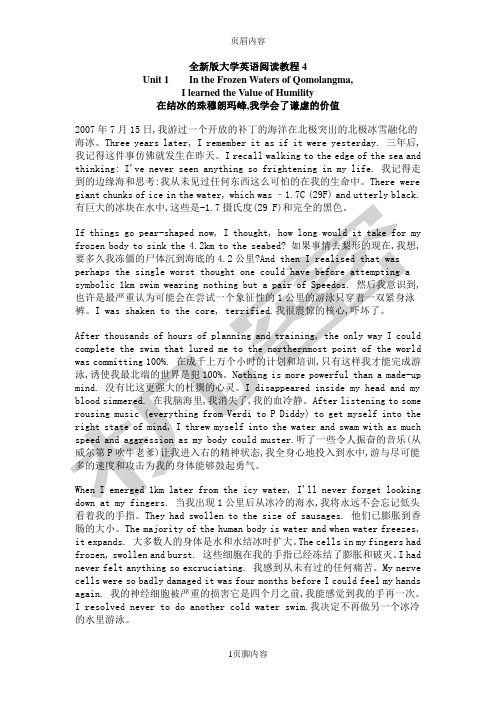
全新版大学英语阅读教程4Unit 1 In the Frozen Waters of Qomolangma,I learned the Value of Humility在结冰的珠穆朗玛峰,我学会了谦虚的价值2007年7月15日,我游过一个开放的补丁的海洋在北极突出的北极冰雪融化的海冰。
Three years later, I remember it as if it were yesterday. 三年后,我记得这件事仿佛就发生在昨天。
I recall walking to the edge of the sea and thinking: I've never seen anything so frightening in my life. 我记得走到的边缘海和思考:我从未见过任何东西这么可怕的在我的生命中。
There were giant chunks of ice in the water, which was –1.7C (29F) and utterly black.,,从看着我的手指。
They had swollen to the size of sausages. 他们已膨胀到香肠的大小。
The majority of the human body is water and when water freezes, it expands. 大多数人的身体是水和水结冰时扩大。
The cells in my fingers had frozen, swollen and burst. 这些细胞在我的手指已经冻结了膨胀和破灭。
I had never felt anything so excruciating. 我感到从未有过的任何痛苦。
My nerve cells were so badly damaged it was four months before I could feel my hands again. 我的神经细胞被严重的损害它是四个月之前,我能感觉到我的手再一次。
阅读教程4中文
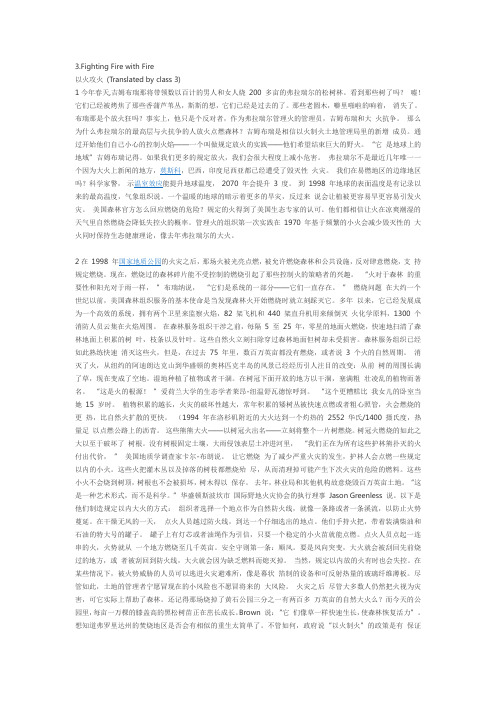
3.Fighting Fire with Fire以火攻火(Translated by class 3)1今年春天,吉姆布瑞那将带领数以百计的男人和女人烧200 多亩的弗拉瑞尔的松树林。
看到那些树了吗?嘘!它们已经被烤焦了那些香蒲芦苇丛,斯斯的想,它们已经是过去的了。
那些老圆木,噼里啪啦的响着,消失了。
布瑞那是个放火狂吗?事实上,他只是个反对者,作为弗拉瑞尔管理火的管理员,吉姆布瑞和大火抗争。
那么为什么弗拉瑞尔的最高层与火抗争的人放火点燃森林?吉姆布瑞是相信以火制火土地管理局里的新增成员。
通过开始他们自己小心的控制火焰——一个叫做规定放火的实践——他们希望结束巨大的野火。
“它是地球上的地域”吉姆布瑞记得。
如果我们更多的规定放火,我们会很大程度上减小危害。
弗拉瑞尔不是最近几年唯一一个最高温度,气象组织说。
一个温暖的地球的暗示着更多的旱灾,反过来说会让植被更容易旱更容易引发火灾。
美国森林官方怎么回应燃烧的危险?规定的火得到了美国生态专家的认可。
他们都相信让火在凉爽潮湿的天气里自然燃烧会降低失控火的概率。
管理火的组织第一次实践在1970 年基于频繁的小火会减少毁灭性的大火同时保持生态健康理论,像去年弗拉瑞尔的大火。
规定燃烧。
现在,燃烧过的森林碎片能不受控制的燃烧引起了那些控制火的策略者的兴趣。
“火对于森林的重要性和阳光对于雨一样,”布瑞纳说,“它们是系统的一部分——它们一直存在。
” 燃烧问题在大约一个世纪以前,美国森林组织服务的基本使命是当发现森林火开始燃烧时就立刻踩灭它。
多年以来,它已经发展成为一个高效的系统,拥有两个卫星来监察火焰,82 架飞机和440 架直升机用来倾倒灭火化学原料,1300 个消防人员云集在火焰周围。
在森林服务组织干涉之前,每隔5 至25 年,零星的地面火燃烧,快速地扫清了森林地面上积累的树叶,枝条以及针叶。
这些自然火立刻扫除穿过森林地面但树却未受损害。
森林服务组织已经如此熟练快速消灭这些火,但是,在过去75 年里,数百万英亩都没有燃烧,或者说3 个火的自然周期。
阅读教程四重要文章
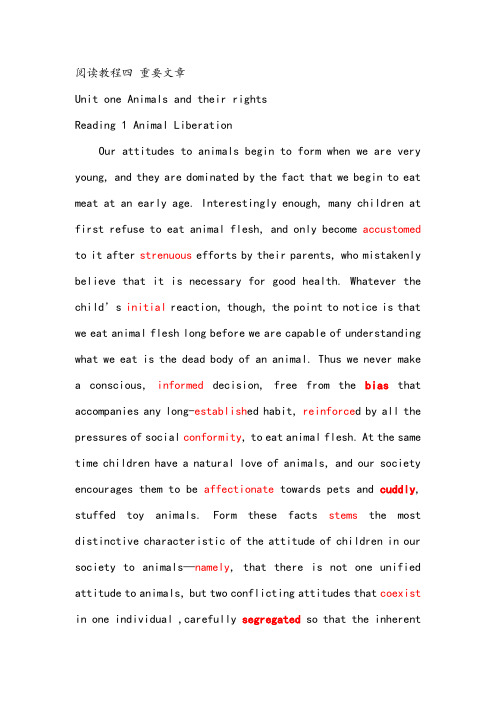
阅读教程四重要文章Unit one Animals and their rightsReading 1 Animal LiberationOur attitudes to animals begin to form when we are very young, and they are dominated by the fact that we begin to eat meat at an early age. Interestingly enough, many children at first refuse to eat animal flesh, and only become accustomed to it after strenuous efforts by their parents, who mistakenly believe that it is necessary for good health. Whatever the child’s initial reaction, though, the point to notice is that we eat animal flesh long before we are capable of understanding what we eat is the dead body of an animal. Thus we never make a conscious, informed decision, free from the bias that accompanies any long-establish ed habit, reinforce d by all the pressures of social conformity, to eat animal flesh. At the same time children have a natural love of animals, and our society encourages them to be affectionate towards pets and cuddly, stuffed toy animals. Form these facts stems the most distinctive characteristic of the attitude of children in our society to animals—namely, that there is not one unified attitude to animals, but two conflicting attitudes that coexist in one individual ,carefully segregated so that the inherentcontradiction between them rarely causes trouble.Not so long ago children were brought up on fairy tales in which animals, especially wolves, were pictured as cunning enemies of man. A characteristic happy ending would leave the wolf drowning in a pond, weighed down by stones which the ingenious hero had sewn in its belly while it was asleep. And in case children missed the implications of these stories they could all join hands and sing a nursery rhyme like:“Three blind mice, see how they run!They all ran after the farmer’s wifeWho cut off their tails with a carving knife.Did you ever see such a thing in your lifeAs three blind mice”For children brought up on these stories and rhymes there was no inconsistency between what they were taught and what they are. Today, however such stories have gone out of fashion, and on the surface all is sweetness and light, so far as children’s attitudes to animals are concerned. Thereby a problem has arisen: what about the animals we eatOne response to this problem is simple evasion. The child’s affection for animals is directed towards animals that are not eaten: dogs, cats and other pets. There are the animalsthat an urban or suburban child is most likely to see. Cuddly, stuffed toy animals are more likely to be bars or lions than pigs or cows. When farm animals are mentioned in picture books and stories, however, evasion may become a deliberate attempt to mislead the child about the nature of modern farms, and so screen him form reality. An example of this is the popular Hallmark book Farm Animals which presents the child with pictures of hens, turkeys, cows and pigs, all surrounded by their young, with not a cage, shed or stall in sight. The text tells us that pigs “enjoy a good meal, then roll in the mud and let out a squeal!”while “Cows don’t have a thing to do, but switch their tails, eat grass and moo.”British books, like The Farm in the best selling Ladybird series, covey the same impression of rural simplicity, showing the hen running freely in an orchard with her chicks, and all the other animals living with their offspring in spacious quarters. With this kind of early reading it is not surprising that children grow up believing that even if animals “must” die to provide human beings with food, they live happily until that time comes.Recognizing the importance of the attitude we form when young, the Women’s Liberation movement has suggested changes in the stories we read to our children. They want braveprincesses to rescue helpless princes occasionally. To alter the stories about animals that we real to our children will not be easy, since cruelty is no t an ideal subject for children’s stories. Yet it should be possible to avoid the more gruesome details, and still give children picture books and stories that encourage respect for animals as independent beings, and not as cute little objects that exist for our amusement and tables; and as children grow older, they can be made aware that most animals live under conditions that are not very pleasant. The difficulty will be that non-vegetarian parents are going to be reluctant to let their children learn the full story, for fear that the child’s affection for animals may disrupt family meals. Even now, one frequently hears that, on learning that animals are killed to provide meat, a friend’s child has refused to eat meat. Unfortunately this instinctive rebellionis likely to meet strong resistance from non-vegetarian parents, and most children are unable to keep their refusal in the face of opposition from parents who provide their meals and tell them that they will not grow up big and strong without meat. One hopes, as knowledge of nutrition spreads, more parents will realize that on this issue their children may be wiser than they are.Unit two Crime and PunishmentReading one The Death Penalty in the United State: Old Enough to Kill, Old Enough to DieIn the United States, 37 states currently allow capital punishment for serious crimes such as murder. Americans have always argued about the death penalty. Today, there is a serious question about this issue: Should there be a minimum age limit for executing criminals In other words, is it right for convicted murderers who kill when they are minors, . , under the age of 18, to receive the death penalty In most countries of the world, there is no capital punishment for minors. In the United States, though, each state makes its own decision. Of the 37 states that allow the death penalty, 30 permit the execution of minors.In the state of South Carolina, a convicted murderer was given the death penalty for a crime he committed while he was a minor. In 1977, when he was 17 years old, James Terry Roach and two friends brutally murdered three people. Roach’s lawyer fought the decision to execute him. The young murderer remained on death row (a separate part of prison for convicted criminals who are sentenced to die) for ten years while his lawyer appealed to the governor. The lawyer argued that it is wrongto execute a person for a crime committed while he was a minor. In the United States, the governor of a state has the power to change a sentence from the death penalty to life in prison. Nonetheless, the governor of South Carolina refused to stop the execution. Roach was finally executed by electrocution in 1986. This is not the first time a minor was executed in South Carolina. In 1944, a 14-year-old boy died in that state’s electric chair.In Indiana, a 16-year-old girl is on death row for a crime she committed when she was 15. Paula Cooper and three friends stabbed an elderly woman to death. They robbed the old woman to get money to play video games. Cooper’s lawyer has appealed to the governor of Indiana to stop the execution because the convicted killer is very young and because she was abused in childhood. The Indiana governor, who favors the death penalty, said that he must let the courts to do their job. Surprisingly, the grandson of the murdered woman agrees with the girl’s lawyer. A deeply religious man, the grandson opposes the execution, too, and writes to his grandmother’s murderer in prison on a regular basis.Although no one believes that either of these killers deserves sympathy, some people believe that capital punishment is too severe for convicted murders who are minors. They feelthat it is wrong to treat minors the same as adults in these case. Opponents of the death penalty in general think it is wrong to take one life for anther. They argue that capital punishment does not protect the victim or the victim’s family. Opponents also suggest that occasionally innocent people may be executed for crimes they did not commit.On the other hand, people who agree with the death penalty argue that it prevents repeat crimes and, therefore, future victims. These proponents of capital punishment believe that fear of the death penalty deters crime. That is, fewer people will commit murder because they fear the death penalty.The laws concerning capital punishment are changing every day. Recently, Indiana raised its minimum age limit for the death penalty to 16. Before that, the age limit in that state was 10. Perhaps other states will change their laws in the future, but in the meantime, the controversy continues.Unit three Gun Ownership and CensorshipReading three: Arming Myself with a Gun Is Not the Answer When my father died 15 years ago, my brother and I inherited the old Midwestern farmhouse our grandparents had purchased in the 1930s. I was the one who decided to give up my harriedexistence as a teacher in New York City and make a life in this idyllic village, population 350, in northern Michigan.A full-time job in the English department of a nearby college quickly followed. I settled into small-town life, charmed by a community where your neighbors are also your friends and no one worries about locking a door. Eventually I forgot about the big-city stress of crowds, noise and crime.I felt safe enough to keep my phone number listed so colleagues and students could reach me after hours. I was totally unprepared when I returned home one evening to an answering machine filled with incoherent and horribly threatening messages. I could identify the voice—it belonged to a former student of mine. Shocked and frightened, I called 911, and an officer arrived in time to pick up the phone and hear the man threaten to rape and kill me. The cop recognized the caller as the stalker in a similar incident that had been reported a few years before, and immediately rushed me out of the house. I soon learned that my would-be assailant had been arrested, according to police, drunk, armed with a 19-inch double-edged knife and just minutes from my door.It was revealed in court testimony that my stalker was a schizophrenic who had fallen through the cracks of themental-health system. In spite of my 10-year personal-protection order, I live with the fear that he will return unsupervised to my community. Time and again, colleagues and friends have argued me to get a gun to protect myself.And why shouldn’t I This part of rural Michigan is home to an avid gun culture. , the opening day of deer-hunting season, is all but an official holiday. It is not uncommon to see the bumper sticker CHARLTON HESTON IS MY PRESIDENT displayed, along with a gun rack, on the back of local pickup trucks.A good friend recommended several different handguns. This assistant prosecutor on the case told me I’d have no problem getting a concealed-weapons permit. A female deputy offered to teach me how to shoot.But I haven’t gotten a gun, and I am not going to. When I questioned them, my friends and colleagues had to admit that they’ve used guns only for recreational purposes, never for self-defense. The assistant prosecutor said that he would never carry a concealed weapon himself. And an ex-cop told me that no matter how much you train, the greatest danger is of hurting yourself.The truth is when you keep a gun for self-protection, you live with constant paranoia. For me, owning a gun and practicingat a target range would be allowing my sense of victimization to corrupt my deepest values.Contrary to all the pro-gun arguments, I don't believe guns are innocent objects. If they were, “gunnies”wouldn’t display them as badges of security and freedom. When someone waves a gun around, he or she is advertising the power to snuff out life. But guns are no deterrent. Like nuclear weapons, they only ensure greater devastation when conflict breaks out or the inevitable human error occurs.I never needed a weapon in the years prior to my terrifying experience. And while I learned not to flinch at the sight of men and women in fluorescent orange carrying rifles into the woods at the start of deer season, owning a gun for play or protection didn’t occur to me. But I’ve learned firsthand that even small, close-knit communities are subject to the kind of social problems—like disintegrating families and substance abuse—that can propel a troubled person toward violence, so I now carry pepper spray and my cell phone at all times.In Michigan—and elsewhere—as federal funding for state mental-health care continues to shrink and state psychiatric hospitals are forced to close, the numbers of untreated, incarcerated and homeless mentally ill are rising. People withserious mental illness and violent tendencies need 24-hour care. It costs less to house them in group homes with trained counselors than it does to keep them in prisons or hospitals. But until states fund more of this kind of care, people like my stalker will continue to return unsupervised to our communities.And people like me will be forced to consider getting guns to protect ourselves. I am lucky. I survived, though not unchanged. I know my fear cannot be managed with a gun. The only reasonable response is to do what I can to help fix the mental-health system. Awareness, education and proper funding will save more lives and relieve more fear than all the guns we can buy.Unit four Life or Death (Euthanasia)Reading two: In Defense of Voluntary EuthanasiaA few short years ago, I lay at the point of death. A congestive heart failure was treated for diagnostic purposes by an angiogram that triggered a stroke. Violent and painful hiccups, uninterrupted for several days and nights, prevented the ingestion of food. My left side and one of my vocal cords became paralyzed. Some form of pleurisy set in, and I felt Iwas drowning in a sea of slime. At one point, my heart stopped beating; just as I lost consciousness, it was thumped back into action again. In one of my lucid intervals during those days of agony, I asked my physician to discontinue all life-supporting services or show me how to do it. He refused and predicted that someday I would appreciate the unwisdom of my request.A month later, I was discharged from the hospital. In six months, I regained the use of my limbs, and although my voice still lacks its old resonance and carrying power I no longer croak like a frog. There remain some minor disabilities and I am restricted to a rigorous, low sodium diet. I have resumed my writing and research.My experience can be and has been cited as an argument against honoring requests of stricken patients to be gently eased out of their pain and life. I cannot agree. There are two main reasons. As an octogenarian, there is a reasonable likelihood that I may suffer another “cardiovascular accident”or worse. I may not even be in a position to ask for the surcease of pain. It seems to me that I have already paid my dues to death—indeed, although time has softened my memories they are vivid enough to justify my saying that Isuffered enough to warrant dying several times over. Why run the risk of moreSecondly, I dread imposing on my family and friends another grim round of misery similar to the one my first attack occasioned.My wife and children endured enough for one lifetime. I know that for them the long days and nights of waiting, the disruption of their professional duties and their own familial responsibilities counted for nothing in their anxiety for me. In their joy at my recovery they have been forgotten. Nevertheless, to visit another prolonged spell of helpless suffering on them as my life ebbs away, or even worse, if I linger on into a comatose senility, seem s altogether gratuitous.But what, it may be asked, of the joy and satisfaction of living, of basking in the sunshine, listening to music, watching one’s grandchildren growing into adolescence, following the news about the fate of freedom in a trouble world, playing with ideas, writing one’s testament of wisdom and folly for posterity It not all that one endured, together with the risk of its recurrence, an acceptable price for the multiple satisfactions that are still open even to a person of advancedyearsApparently those who cling to life no matter what think so.I do not.The zest and intensity of these experiences are no longer what they used to be. I am not vain enough to delude myself that I can in the few remaining years make an important discovery useful for mankind or can lead a social movement of do anything that will be historically eventful, not less eventful-making. My autobiography, which describes a record of intellectual and political experiences of some historical value, already much too long, could be posthumously published. I have had my fill of joys and sorrows and am not greedy for more life. I have always thought that a test of whether one had found happiness in one’s life is whether one would be willing to relive it—whether, if it were possible, one would accept the opportunity to be born again.Having lived a full and relatively happy life, I would cheerfully accept the chance to be reborn, but certainly not be reborn again as an infirm octogenarian. To some extent, my views reflect what I have seen happen to the aged and stricken who have been so unfortunate as to survive crippling paralysis. They suffer, and impose suffering on others, unable even to makea request that their torment be ended.I am mindful too of the burdens placed upon the community, with its rapidly diminishing resources, to provide the adequate and costly services necessary to sustain the lives of those whose days and night s are spent on mattress graves of pain.A better use could be made of these resources to increase the opportunities and qualities of life for the young. I am not denying the moral obligation the community has to look after its disabled and aged. There are times, however, when an individual may find it pointless to insist on the fulfillment of a legal and moral right.What is required is no great revolution in morals but an enlargement of imagination and an intelligent evaluation of alternative uses of community resources.Long age, Seneca observed that “the wise man will lives as long as he ought, not as long as he can.” One can envisage hypothetical circumstances in which one has a duty to prolong one’s life despite its costs for the sake of others, but such circumstances are far removed from the ordinary prospects we are considering. If wisdom is rooted in knowledge or the alternatives of choice, it must be reliably informed of the state one is in and its likely outcome. Scientific medicine isnot infallible, but it is the best we have. Should a rational person be willing to endure acute suffering merely on the chance that a miraculous cure might presently be at hand Each one should be permitted to make his own choice—especially when no one else is harmed by it.The responsibility for the decision whether deemed wise or foolish, must be with the chooser.Unit Five Motivation or Unhealthy Experience (competition) Reading one: Why CompetitionI would not complain about the absurd sight of grown men shrieking and cursing on Sunday afternoons if it were not for the significance of the role played by competition in our culture. It is bad enough that fighting is actually regarded a s a sport; it is worse that the outcome of even the gentlest of competitions—baseball—can induce fans to hysteria and violence. Our entire society is affected by the need to be “better man”.I believe that competition by its very nature is always unhealthy. This is true, to begin with, because competition and cooperation are mutually exclusive. I say this fully aware of the team spirit that is supposed to develop among players—orsoldiers—on the same side. First, I have doubts, base on personal experience, concerning the depth and fullness of relationship that result from the need to become e more effective against a common enemy. Second, those on the other side are generally regarded with suspicion and contempt in any competitive situation.The desire to win has a not very surprising characteristic: it tends to edge out other goals and values in the context of any given competitive activity. When I was in high school, I was a very successful debater for a school that had one of the country’s better team. After hundreds and hundreds of rounds of competition over the three years, I can assert that the purpose of debate is not to seek the truth ore resolve an issue, the only reason debaters sacrifice their free time collecting thousands of pieces of evidence, analyzing argument, and practicing speeches, is to win.The cost of any kind of competition in human terms is incalculable. When my success depends on other people’s failure, there is little possibility of building a real human community. Moreover, when my success depends on my being better man, I am caught on a treadmill, destined never to enjoy real satisfaction. Someone is always one step higher, and even thesummit is a dangerous position in light of the many waiting to occupy it in my stead. I am thus perpetually insecure and perpetually anxious.I begin to see my self-worth as conditional on how much better I am than so many others I so many activities. If you believe as I do, that unconditional self-esteem is a very important requirement for mental health, then the destructiveness of competition will clearly outweigh any benefit.By taking the first step of understanding that competition of any kind is both psychologically harmful and philosophically unjustifiable, that the phrase “healthy competition “ is a contradiction, only then can we begin to lead more normal, richer lives.。
英语阅读教程参考资料(第四册)
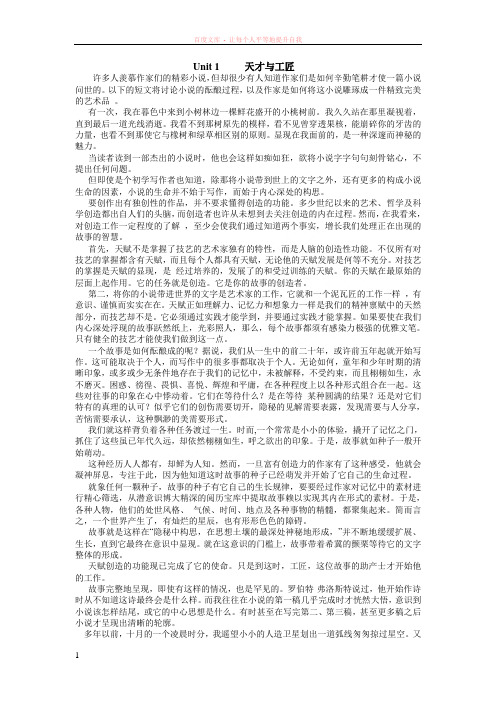
Unit 1 天才与工匠许多人羡慕作家们的精彩小说,但却很少有人知道作家们是如何辛勤笔耕才使一篇小说问世的。
以下的短文将讨论小说的酝酿过程,以及作家是如何将这小说雕琢成一件精致完美的艺术品。
有一次,我在暮色中来到小树林边一棵鲜花盛开的小桃树前。
我久久站在那里凝视着,直到最后一道光线消逝。
我看不到那树原先的模样,看不见曾穿透果核,能崩碎你的牙齿的力量,也看不到那使它与橡树和绿草相区别的原则。
显现在我面前的,是一种深邃而神秘的魅力。
当读者读到一部杰出的小说时,他也会这样如痴如狂,欲将小说字字句句刻骨铭心,不提出任何问题。
但即使是个初学写作者也知道,除那将小说带到世上的文字之外,还有更多的构成小说生命的因素,小说的生命并不始于写作,而始于内心深处的构思。
要创作出有独创性的作品,并不要求懂得创造的功能。
多少世纪以来的艺术、哲学及科学创造都出自人们的头脑,而创造者也许从未想到去关注创造的内在过程。
然而,在我看来,对创造工作一定程度的了解,至少会使我们通过知道两个事实,增长我们处理正在出现的故事的智慧。
首先,天赋不是掌握了技艺的艺术家独有的特性,而是人脑的创造性功能。
不仅所有对技艺的掌握都含有天赋,而且每个人都具有天赋,无论他的天赋发展是何等不充分。
对技艺的掌握是天赋的显现,是经过培养的,发展了的和受过训练的天赋。
你的天赋在最原始的层面上起作用。
它的任务就是创造。
它是你的故事的创造者。
第二,将你的小说带进世界的文字是艺术家的工作,它就和一个泥瓦匠的工作一样,有意识、谨慎而实实在在。
天赋正如理解力、记忆力和想象力一样是我们的精神禀赋中的天然部分,而技艺却不是。
它必须通过实践才能学到,并要通过实践才能掌握。
如果要使在我们内心深处浮现的故事跃然纸上,光彩照人,那么,每个故事都须有感染力极强的优雅文笔。
只有健全的技艺才能使我们做到这一点。
一个故事是如何酝酿成的呢?据说,我们从一生中的前二十年,或许前五年起就开始写作。
阅读教程4_passage3
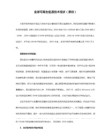
尽管叶子变色是每个秋天的事,但每当看到那壮观的颜色的show,我们还是无可避免的被它所感动。我们知道何时能期待这美丽的叶子,我们也知道如何去赞美它们,但我们不知道颜色是怎样转变过来的。在这篇选文里,Diane 教会我们一个自然的秘密。当他讲解秋叶呈现那耀眼的色彩的过程的时候,注意他与人分享他对大自然的热情的方式。
但变了色的叶子是怎样凋落的???当叶子年老,生长的动力,植物激素,开始减少,在叶柄基部的细胞分离,正处在叶柄轴处的两三行小细胞受水的驱动而分开,于是叶柄只由木质部的几条丝线维系,一阵微风,叶子就会飘入空中,它们在看不见的摇篮里翻滚,滑翔,飞扑,它们像翅膀一般随着旋风或上升气流,转着圈,从一个院落跑到另一个院落。被束缚在地上的人们,非常乐见飞来飞去的东西:肥皂泡,气球,鸟。。。。。还有飞舞的叶子。它们提醒着我们,秋末这生命的尾个人都懂得那种风情。
秋天总人们无意中到来。那征兆是来自九月栖息于树林的金丝雀,还是第一块变色的叶子??一只红翼的黑鸟,还是接近找到冬天的糖枫??带着豹子般的锐利目光,我们在那里眯着眼睛,盯着它的一举一动。清早的霜压弯了青草的腰,也使带尖刺的铁丝变成一串串星星。远处的山上,一小块黄色似乎成了明亮的舞台。我们渐渐的明白了这一事实:秋天正带着它的行李-------寒冷的夜晚,可怕的假期,壮观的令人心跳的美丽树叶--------如期的蹒跚而来。很快树叶开始皱缩,变成握紧的拳头并掉落。干燥的心皮会像小葫芦一般卡塔卡塔的响。但在这一切出现之前,涌现出各种或明亮,或柔和,或五彩的色彩,人们都赶到东海岸去观赏这叶子的季节。
并不是所有的叶子都是同一种色,榆树,垂柳及古老的银杏都是亮黄色的,同属此色的还有山杨,七叶树,林鼠(麦菊)草,以及高到的沙沙作响的杨树。近水的枫树演奏这猩红的交响乐,漆树,山茱萸,多花紫树,胶皮糖香树都是红色的。虽然一些橡树显黄色,其实更多显粉红褐色随着玉米杆与一捆捆的切好的小麦杆变干,农场也开始转色。有时候,山的一侧会比另一侧更鲜绿,这是因为南坡接受到更多的光和热。
阅读教程4 Unit 1 Animals and Their Rights

Unit 1 Animals and Their Rights Pre-reading (Q & D & A) While-reading (C) Post-reading (S)
What are they?
Pig, dolphin, dog, racoon, lizard, duck Can you find a word to describe them?
Step One: Warming-up
Task 1: Discussion
Watch the following video and think about the animal image in the cartoon.
What do you think of the animals in the video? What are their images?
What duocaunwgaanint tforolmeartnhifsrocomurtsheisacroe…ur…se? How to enlarge your vocabulary How to get higher points in English tests How to Increase reading fluency How to develop reading interests How to improve writing How to instill a life-long SL reading habit
Fairy tales we read in our childhood often have animals as heroes. When very young, we learned that monkeys are smart, rabbits clever, mice busy carrying food into their holes, and Mother Bear and Daddy Bear work hard to raise their children as humans do. However, we grow up by eating animal flesh: we grow up to see little animals being experimented on in laboratories. Medical advances in treating diseases of human beings, it is claimed, are made through such experiments on animals. Don’t you think our childhood education about animals seems to be paradoxical to what we have to face later in life? Are we justified to test on and kill animals to appease human suffering?
全新版大学英语阅读教程4教案
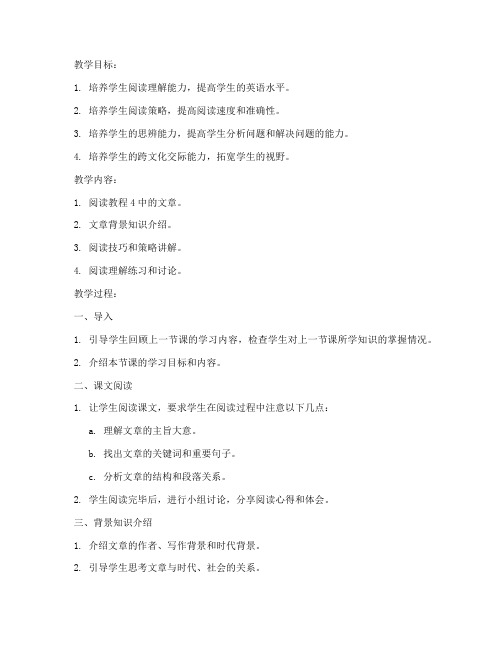
教学目标:1. 培养学生阅读理解能力,提高学生的英语水平。
2. 培养学生阅读策略,提高阅读速度和准确性。
3. 培养学生的思辨能力,提高学生分析问题和解决问题的能力。
4. 培养学生的跨文化交际能力,拓宽学生的视野。
教学内容:1. 阅读教程4中的文章。
2. 文章背景知识介绍。
3. 阅读技巧和策略讲解。
4. 阅读理解练习和讨论。
教学过程:一、导入1. 引导学生回顾上一节课的学习内容,检查学生对上一节课所学知识的掌握情况。
2. 介绍本节课的学习目标和内容。
二、课文阅读1. 让学生阅读课文,要求学生在阅读过程中注意以下几点:a. 理解文章的主旨大意。
b. 找出文章的关键词和重要句子。
c. 分析文章的结构和段落关系。
2. 学生阅读完毕后,进行小组讨论,分享阅读心得和体会。
三、背景知识介绍1. 介绍文章的作者、写作背景和时代背景。
2. 引导学生思考文章与时代、社会的关系。
四、阅读技巧和策略讲解1. 讲解阅读技巧,如快速浏览、查找关键词、归纳总结等。
2. 讲解阅读策略,如预测、推断、推理等。
3. 通过实例分析,让学生掌握阅读技巧和策略。
五、阅读理解练习1. 设计阅读理解练习题,让学生巩固所学知识。
2. 学生独立完成练习题,教师批改并讲解答案。
六、讨论1. 引导学生就文章内容进行讨论,如观点、价值观等。
2. 鼓励学生提出自己的看法,培养学生的思辨能力。
七、总结1. 总结本节课的学习内容,强调重点和难点。
2. 鼓励学生在课后继续阅读,提高英语水平。
教学评价:1. 通过课堂提问、小组讨论等方式,评价学生对文章内容的理解和掌握程度。
2. 通过阅读理解练习和讨论,评价学生的阅读技巧和策略运用能力。
3. 通过课后作业,评价学生的阅读习惯和自主学习能力。
阅读教程四 复习重点
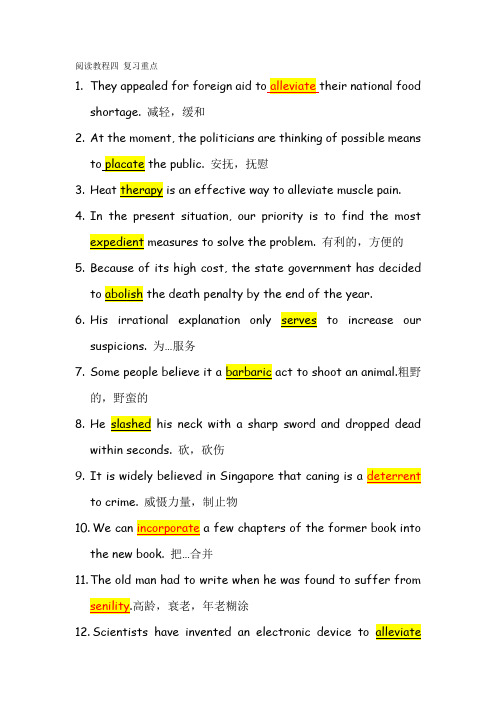
阅读教程四复习重点1.shortage. 减轻,缓和2.At the moment, the politicians are thinking of possible means安抚,抚慰3.4.In the present situation, our priority is to find the most有利的,方便的5.Because of its high cost, the state government has decided6.His irrational explanation only serves to increase our suspicions. 为…服务7.粗野的,野蛮的8.He slashed his neck with a sharp sword and dropped dead within seconds. 砍,砍伤9.It is widely believedto crime. 威慑力量,制止物10.the new book. 把…合并11.The old man had to write when he was found to suffer from高龄,衰老,年老糊涂12.Scientists have invented an electronic device toback pain. 减轻13.may need a bit of both to achieve success in your studies.唯一的,排外的,除外的,全部的14.The recovery from his illness will be entirely conditional on his cooperation with his doctors.以…为条件15.The differences between educated, skilled and highly-paid workers on the one hand and unskilled, illiterate of unemployed workers on the other may well outweigh what they have in common. 超过16.My nerves were so strained I was probably on the point of情绪爆发,情绪激动17.He knew her too well to think that she would allow affection18.Our policy is to wider participation and more opportunity in higher education. 促使,促进19.Her oval face with its large dark eyes and high forehead was20.W ithin a few years, their firm had become a leader in themove to one of Wall Street’主要的,显著的21.the accident.代理者,代理人22.T敌意23.I分担24.H is amazing recovery confounded the medical specialists.使困惑,使混乱,混淆25.S26.H er husband’s extra-marital affairs left her in a state of深深的,深刻的27.H e abolished slavery and segregation and brought about freedom for his citizens.28.M any people tend to their success to external causes such as luck.29.T he book will be dispatches from our warehouse to your address tomorrow.30.T he club members did agree their recruitment policy.31.The test is supposed to reveal major character traits; whether a person is generally pessimistic or optimistic, introvert or extrovert, etc.32.T he aborigines peered at our cameras with malevolent curiosity. 有恶意的,坏心肠的33.D on’t panic! This is just a simulation of fighting, not a realwar scene.34.T he country is preoccupied with inventing some sort of potent new weapons.强有力的35.I counted up my years of working in this factory and felt sad that I had to retire before my time.36.T he villagers took their revenge by setting fire to his mill.37.Y ou need to free up some space on the hard disk to run this program on your computer.38.T he man’s malevolent stare makes me shudder.39.Y ou are wrong if you imagine that married life will be idyllic.田园诗的,牧歌的40.T he medical community should not flinch in the face of this challenge.畏惧,退缩41.John was propelled by both guilt and the need to turn himself in to the police. 驱策,42.T here has been a long spell of rainy weather.一段时间了43.H e was writing his autobiography for the benefit of posterity.后裔,子孙,后代44.P hysics appears a strong, fundamental discipline; computing;a strong, pervasive one;普遍的45.W e have to decide on what constitutes a majority vote—whether it is at least 50%or 60% of those present.制定,制定46.Tthis new scheme.47.T he baby was strapped to a highchair so he could safely watch us cooking. 用带绑住48.Tthe time being.认为49.M any people in the SAR-affected areas are viewing the world with a mounting paranoia.偏执狂50.P aranoia antique古老的bloodshed流血,杀人strap censorship审查(制度),审查员serve count up simulation figure infringe违反,侵犯revenge perception感知,认识,洞察力legitimate合法的,正当的,使…为合法flinch idyllic reap1.Many children at first refuse to eat animal flesh, and only become accustomed to it after strenuous effort by their parents. Para1Many children at first refuse to eat animal flesh. They later become used to eating it just because their parents try hard to persuade them to eat it.1.It’s time to reap the rewards, to count up the ways we’rebenefiting from his death. Para1Now we can enjoy the benefits and list in what ways we benefit from his death.5. Maybe the benefit we got from killing Harding is less tangible. Para 25Perhaps the benefit we got from killing Harding is not easy to see.1.Some form of participation in a gun-safety program should be mandatory, particularly for first-time purchasers. Para4A gun safety program should be made a must for gun owners, especially those who buy guns for the first time.2.The truth is when you keep a gun for self-protection, you live with constant paranoia. Para8When you keep a gun to protect yourself, you live in constant fear and worry.1.I have doubts, based on personal experience, concerning the depth and fullness of relationships that result from the need to become more effective against a common enemy. Para2 From my own experience, I don’t think that we can develop deep and full relationships by trying to compete and win against a common enemy.2.I begin to see my self-worth as conditional on how muchbetter I am than so many others in so many activities. Para.5 I start to see that my confidence in my personal value and worth is dependent on how much better I am than so many others in so many activities.3.They view cc as an ethical dry run for human cloning, and they are troubled by how the rehearsal is going. Para11They regard cc as a test of how much people may tolerate human cloning ethically, and they worry because this trial试验的experiment has been received so well.2.That such couples have other options is not an argument for denying them the right to clone.para2The fact that infertile不孕的couples have other choices does not give us the right to prevent them from trying cloning.3.In a democratic society we don’t usually pass laws outlawing something before there is actual or probable evidence of harm. Para6Democratic societies generally only ban things when there is convincing evidence of harm that they may bring.1.But now I know that nuclear weapons are monstrous instruments that threaten to obliterate life on our beautiful planet. Para 5But now I know that nuclear weapons are terrible and frightening instruments that can completely wipe out all forms of life on planet Earth.5. In medicine, for example, “gene therapy”may give us treatments for those diseases attributed, in part, to a person’s genetic make-up. Para 15Gene technology, when applied in medicine, can help treat diseases partially caused by one’s genetic structure结构.2.Surely they must give pause to those who insist on their”right” to own guns. Para2(The figures and cases of gun accidents and killing) surely will make people think twice before they insist on having their right to own guns.3.Opponents also liken gun control to censorship. If I couldn’t speak, perhaps my quality of living would be reduced, but I would still be breathing. Para5Opponents of gun control also think that gun control is similarcertain things, my quality of life may be lowered, but I will still be alive.4.He refused and predicted that someday I would appreciate the unwisdom of my request. Para1The doctor turned down my request of discontinuing the life-supporting services and said that someday I would understand the request was not wise.4.I dread imposing on my family and friends another grim round of misery similar to the one my first attack occasioned. Para 4I am scared that I would suffer from another heart attack or stroke and make my family and friends suffer what they suffered during my first attack.5. To some extent, my views reflect what I have seen happen to the aged and stricken who have been so unfortunate as to survive crippling paralysis. Para9In a way, my views reflect the reality of those old and sick使麻痹When my father died 15 years ago, my brother and I inherited the old Midwestern farmhouse our grandparents had purchased in the 1930s. I was the one who decided to give up my harried existence as a teacher in New York City and make a life in this idyllic village, population 350, in northern Michigan.A full-time job in the English department of a nearbycollege quickly followed. I settled into small-town life, charmed by a community where your neighbors are also your friends and no one worries about locking a door. Eventually I forgot about the big-city stress of crowds, noise and crime.I felt safe enough to keep my phone number listed so colleagues and students could reach me after hours. I was totally unprepared when I returned home one evening to an answering machine filled with incoherent无条理的and horribly threatening messages. I could identify the voice—it belonged to a former student of mine. Shocked and frightened, I called 911, and an officer arrived in time to pick up the phone and hear the man threaten to rape and kill me. The cop recognized the caller as the stalker潜行而近者in a similar incident that had been reported a few years before, and immediately rushed me out of the house. I soon learned that my would-be assailant袭击者had been arrested, according to police, drunk, armed with a 19-inch double-edged knife and just minutes from my door.It was revealed in court testimony证明that my stalker was a schizophrenic精神分裂者who had fallen through the cracks of the mental-health system. In spite of my 10-year personal-protection order, I live with the fear that he will return unsupervised to my community. Time and again,colleagues and friends have argued me to get a gun to protect myself.And why shouldn’t I? This part of rural Michigan is home to an avid渴望的gun culture. Nov.15, the opening day of deer-hunting season, is all but an official holiday. It is not uncommon to see the bumper sticker CHARLTON HESTON IS MY PRESIDENT displayed, along with a gun rack, on the back of local pickup trucks.A good friend recommended several different handguns. This assistant prosecutor on the case told me I’d have no problem getting a concealed-weapons permit. A female deputy offered to teach me how to shoot.But I haven’t gotten a gun, and I am not going to. When I questioned them, my friends and colleagues had to admit that they’ve used guns only for recreational purposes, never for self-defense. The assistant prosecutor said that he would never carry a concealed weapon himself. And an ex-cop told me that no matter how much you train, the greatest danger is of hurting yourself.The truth is when you keep a gun for self-protection, you live with constant paranoia. For me, owning a gun and practicing at a target range would be allowing my sense of victimization tocorrupt my deepest values.Contrary to all the pro-gun arguments, I don't believe guns are innocent objects. If they were, “gunnies”wouldn’t display them as badges of security and freedom. When someone waves a gun around, he or she is advertising the power to snuff out life. But guns are no deterrent. Like nuclear weapons, they only ensure greater devastation蹂躏,破坏when conflict breaks out or the inevitable human error occurs.I never needed a weapon in the years prior to my terrifying experience. And while I learned not to flinch at the sight of men and women in fluorescent orange carrying rifles into the woods at the start of deer season, owning a gun for play or protection didn’t occur to me. But I’ve learned firsthand that even small, close-knit紧密结合的,严谨的communities are subject to the kind of social problems—like disintegrating families and substance abuse—that can propel驱策,推动a troubled person toward violence, so I now carry pepper spray and my cell phone at all times.In Michigan—and elsewhere—as federal funding for state mental-health care continues to shrink and state psychiatric hospitals are forced to close, the numbers of untreated, incarcerated and homeless mentally ill are rising. People withserious mental illness and violent tendencies need 24-hour care. It costs less to house them in group homes with trained counselors than it does to keep them in prisons or hospitals. But until states fund more of this kind of care, people like my stalker will continue to return unsupervised to our communities. And people like me will be forced to consider getting guns to protect ourselves. I am lucky. I survived, though not unchanged.I know my fear cannot be managed with a gun. The only reasonable response is to do what I can to help fix the mental-health system. Awareness, education and proper funding will save more lives and relieve more fear than all the guns we can buy.。
- 1、下载文档前请自行甄别文档内容的完整性,平台不提供额外的编辑、内容补充、找答案等附加服务。
- 2、"仅部分预览"的文档,不可在线预览部分如存在完整性等问题,可反馈申请退款(可完整预览的文档不适用该条件!)。
- 3、如文档侵犯您的权益,请联系客服反馈,我们会尽快为您处理(人工客服工作时间:9:00-18:30)。
阅读教程四重要文章Unit one Animals and their rightsReading 1 Animal LiberationOur attitudes to animals begin to form when we are very young, and they are dominated by the fact that we begin to eat meat at an early age. Interestingly enough, many children at first refuse to eat animal flesh, and only become accustomed to it after strenuous efforts by their parents, who mistakenly believe that it is necessary for good health. Whatever the child’s initial reaction, though, the point to notice is that we eat animal flesh long before we are capable of understanding what we eat is the dead body of an animal. Thus we never make a conscious, informed decision, free from the bias that accompanies any long-establish ed habit, reinforce d by all the pressures of social conformity, to eat animal flesh. At the same time children have a natural love of animals, and our society encourages them to be affectionate towards pets and cuddly, stuffed toy animals. Form these facts stems the most distinctive characteristic of the attitude of children in our society to animals—namely, that there is not one unified attitude to animals, but two conflicting attitudes that coexist in one individual ,carefully segregated so that the inherentcontradiction between them rarely causes trouble.Not so long ago children were brought up on fairy tales in which animals, especially wolves, were pictured as cunning enemies of man. A characteristic happy ending would leave the wolf drowning in a pond, weighed down by stones which the ingenious hero had sewn in its belly while it was asleep. And in case children missed the implications of these stories they could all join hands and sing a nursery rhyme like:“Three blind mice, see how they run!They all ran after the farmer’s wifeWho cut off their tails with a carving knife.Did you ever see such a thing in your lifeAs three blind mice?”For children brought up on these stories and rhymes there was no inconsistency between what they were taught and what they are. Today, however such stories have gone out of fashion, and on the surface all is sweetness and light, so far as children’s attitudes to animals are concerned. Thereby a problem has arisen: what about the animals we eat?One response to this problem is simple evasion. The child’s affection for animals is directed towards animals that are not eaten: dogs, cats and other pets. There are the animals that anurban or suburban child is most likely to see. Cuddly, stuffed toy animals are more likely to be bars or lions than pigs or cows. When farm animals are mentioned in picture books and stories, however, evasion may become a deliberate attempt to mislead the child about the nature of modern farms, and so screen him form reality. An example of this is the popular Hallmark book Farm Animals which presents the child with pictures of hens, turkeys, cows and pigs, all surrounded by their young, with not a cage, shed or stall in sight. The text tells us that pigs “enjoy a good meal, then roll in the mud and let out a squeal!” while “Cows don’t have a thing to do, but switch their tails, eat grass and moo.” British books, like The Farm in the best selling Ladybird series, covey the same impression of rural simplicity, showing the hen running freely in an orchard with her chicks, and all the other animals living with their offspring in spacious quarters. With this kind of early reading it is not surprising that children grow up believing that even if animals “must”die to provide human beings with food, they live happily until that time comes.Recognizing the importance of the attitude we form when young, the Women’s Liberation movement has suggested changes in the stories we read to our children. They want brave princesses to rescue helpless princes occasionally. To alter thestories about animals that we real to our children will not be easy, since cruelty is no t an ideal subject for children’s stories. Yet it should be possible to avoid the more gruesome details, and still give children picture books and stories that encourage respect for animals as independent beings, and not as cute little objects that exist for our amusement and tables; and as children grow older, they can be made aware that most animals live under conditions that are not very pleasant. The difficulty will be that non-vegetarian parents are going to be reluctant to let their children learn the full story, for fear that the child’s affection for animals may disrupt family meals. Even now, one frequently hears that, on learning that animals are killed to provide meat, a friend’s child has refused to eat meat. Unfortunately this instinctive rebellion is likely to meet strong resistance from non-vegetarian parents, and most children are unable to keep their refusal in the face of opposition from parents who provide their meals and tell them that they will not grow up big and strong without meat. One hopes, as knowledge of nutrition spreads, more parents will realize that on this issue their children may be wiser than they are.Unit two Crime and PunishmentReading one The Death Penalty in the United State: Old Enough to Kill, Old Enough to Die?In the United States, 37 states currently allow capital punishment for serious crimes such as murder. Americans have always argued about the death penalty. Today, there is a serious question about this issue: Should there be a minimum age limit for executing criminals? In other words, is it right for convicted murderers who kill when they are minors, i.e. , under the age of 18, to receive the death penalty? In most countries of the world, there is no capital punishment for minors. In the United States, though, each state makes its own decision. Of the 37 states that allow the death penalty, 30 permit the execution of minors.In the state of South Carolina, a convicted murderer was given the death penalty for a crime he committed while he was a minor. In 1977, when he was 17 years old, James Terry Roach and two friends brutally murdered three people. Roach’s lawyer fought the decision to execute him. The young murderer remained on death row (a separate part of prison for convicted criminals who are sentenced to die) for ten years while his lawyer appealed to the governor. The lawyer argued that it is wrong to execute a person for a crime committed while he was aminor. In the United States, the governor of a state has the power to change a sentence from the death penalty to life in prison. Nonetheless, the governor of South Carolina refused to stop the execution. Roach was finally executed by electrocution in 1986. This is not the first time a minor was executed in South Carolina. In 1944, a 14-year-old boy died in that state’s electric chair.In Indiana, a 16-year-old girl is on death row for a crime she committed when she was 15. Paula Cooper and three friends stabbed an elderly woman to death. They robbed the old woman to get money to play video games. Cooper’s lawyer has appealed to the governor of Indiana to stop the execution because the convicted killer is very young and because she was abused in childhood. The Indiana governor, who favors the death penalty, said that he must let the courts to do their job. Surprisingly, the grandson of the murdered woman agrees with the girl’s lawyer. A deeply religious man, the grandson opposes the execution, too, and writes to his grandmother’s murderer in prison on a regular basis.Although no one believes that either of these killers deserves sympathy, some people believe that capital punishment is too severe for convicted murders who are minors. They feelthat it is wrong to treat minors the same as adults in these case. Opponents of the death penalty in general think it is wrong to take one life for anther. They argue that capital punishment does not protect the victim or the victim’s family. Opponents also suggest that occasionally innocent people may be executed for crimes they did not commit.On the other hand, people who agree with the death penalty argue that it prevents repeat crimes and, therefore, future victims. These proponents of capital punishment believe that fear of the death penalty deters crime. That is, fewer people will commit murder because they fear the death penalty.The laws concerning capital punishment are changing every day. Recently, Indiana raised its minimum age limit for the death penalty to 16. Before that, the age limit in that state was 10. Perhaps other states will change their laws in the future, but in the meantime, the controversy continues.Unit three Gun Ownership and CensorshipReading three: Arming Myself with a Gun Is Not the AnswerWhen my father died 15 years ago, my brother and I inherited the old Midwestern farmhouse our grandparents hadpurchased in the 1930s. I was the one who decided to give up my harried existence as a teacher in New York City and make a life in this idyllic village, population 350, in northern Michigan.A full-time job in the English department of a nearby college quickly followed. I settled into small-town life, charmed by a community where your neighbors are also your friends and no one worries about locking a door. Eventually I forgot about the big-city stress of crowds, noise and crime.I felt safe enough to keep my phone number listed so colleagues and students could reach me after hours. I was totally unprepared when I returned home one evening to an answering machine filled with incoherent and horribly threatening messages. I could identify the voice—it belonged to a former student of mine. Shocked and frightened, I called 911, and an officer arrived in time to pick up the phone and hear the man threaten to rape and kill me. The cop recognized the caller as the stalker in a similar incident that had been reported a few years before, and immediately rushed me out of the house. I soon learned that my would-be assailant had been arrested, according to police, drunk, armed with a 19-inch double-edged knife and just minutes from my door.It was revealed in court testimony that my stalker was aschizophrenic who had fallen through the cracks of the mental-health system. In spite of my 10-year personal-protection order, I live with the fear that he will return unsupervised to my community. Time and again, colleagues and friends have argued me to get a gun to protect myself.And why shouldn’t I? This part of rural Michigan is home to an avid gun culture. Nov.15, the opening day of deer-hunting season, is all but an official holiday. It is not uncommon to see the bumper sticker CHARLTON HESTON IS MY PRESIDENT displayed, along with a gun rack, on the back of local pickup trucks.A good friend recommended several different handguns. This assistant prosecutor on the case told me I’d have no problem getting a concealed-weapons permit. A female deputy offered to teach me how to shoot.But I haven’t gotten a gun, and I am not going to. When I questioned them, my friends and colleagues had to admit that they’ve used guns only for recreational purposes, never for self-defense. The assistant prosecutor said that he would never carry a concealed weapon himself. And an ex-cop told me that no matter how much you train, the greatest danger is of hurtingyourself.The truth is when you keep a gun for self-protection, you live with constant paranoia. For me, owning a gun and practicing at a target range would be allowing my sense of victimization to corrupt my deepest values.Contrary to all the pro-gun arguments, I don't believe guns are innocent objects. If they were, “gunnies”wouldn’t display them as badges of security and freedom. When someone waves a gun around, he or she is advertising the power to snuff out life. But guns are no deterrent. Like nuclear weapons, they only ensure greater devastation when conflict breaks out or the inevitable human error occurs.I never needed a weapon in the years prior to my terrifying experience. And while I learned not to flinch at the sight of men and women in fluorescent orange carrying rifles into the woods at the start of deer season, owning a gun for play or protection didn’t occur to me. But I’ve learned firsthand that even small, close-knit communities are subject to the kind of social problems—like disintegrating families and substance abuse—that can propel a troubled person toward violence, so I now carry pepper spray and my cell phone at all times.In Michigan—and elsewhere—as federal funding for statemental-health care continues to shrink and state psychiatric hospitals are forced to close, the numbers of untreated, incarcerated and homeless mentally ill are rising. People with serious mental illness and violent tendencies need 24-hour care. It costs less to house them in group homes with trained counselors than it does to keep them in prisons or hospitals. But until states fund more of this kind of care, people like my stalker will continue to return unsupervised to our communities.And people like me will be forced to consider getting guns to protect ourselves. I am lucky. I survived, though not unchanged. I know my fear cannot be managed with a gun. The only reasonable response is to do what I can to help fix the mental-health system. Awareness, education and proper funding will save more lives and relieve more fear than all the guns we can buy.Unit four Life or Death (Euthanasia)Reading two: In Defense of Voluntary EuthanasiaA few short years ago, I lay at the point of death. A congestive heart failure was treated for diagnostic purposes by an angiogram that triggered a stroke. Violent and painful hiccups, uninterrupted for several days and nights, preventedthe ingestion of food. My left side and one of my vocal cords became paralyzed. Some form of pleurisy set in, and I felt I was drowning in a sea of slime. At one point, my heart stopped beating; just as I lost consciousness, it was thumped back into action again. In one of my lucid intervals during those days of agony, I asked my physician to discontinue all life-supporting services or show me how to do it. He refused and predicted that someday I would appreciate the unwisdom of my request.A month later, I was discharged from the hospital. In six months, I regained the use of my limbs, and although my voice still lacks its old resonance and carrying power I no longer croak like a frog. There remain some minor disabilities and I am restricted to a rigorous, low sodium diet. I have resumed my writing and research.My experience can be and has been cited as an argument against honoring requests of stricken patients to be gently eased out of their pain and life. I cannot agree. There are two main reasons. As an octogenarian, there is a reasonable likelihood that I may suffer another “cardiovascular accident”or worse. I may not even be in a position to ask for the surcease of pain. It seems to me that I have already paid my dues to death—indeed, although time has softened my memories theyare vivid enough to justify my saying that I suffered enough to warrant dying several times over. Why run the risk of more?Secondly, I dread imposing on my family and friends another grim round of misery similar to the one my first attack occasioned.My wife and children endured enough for one lifetime. I know that for them the long days and nights of waiting, the disruption of their professional duties and their own familial responsibilities counted for nothing in their anxiety for me. In their joy at my recovery they have been forgotten. Nevertheless, to visit another prolonged spell of helpless suffering on them as my life ebbs away, or even worse, if I linger on into a comatose senility, seem s altogether gratuitous.But what, it may be asked, of the joy and satisfaction of living, of basking in the sunshine, listening to music, watching one’s grandchildren growing into adolescence, following the news about the fate of freedom in a trouble world, playing with ideas, writing one’s testament of wisdom and folly for posterity? It not all that one endured, together with the risk of its recurrence, an acceptable price for the multiple satisfactions that are still open even to a person of advanced years?Apparently those who cling to life no matter what think so.I do not.The zest and intensity of these experiences are no longer what they used to be. I am not vain enough to delude myself that I can in the few remaining years make an important discovery useful for mankind or can lead a social movement of do anything that will be historically eventful, not less eventful-making. My autobiography, which describes a record of intellectual and political experiences of some historical value, already much too long, could be posthumously published. I have had my fill of joys and sorrows and am not greedy for more life.I have always thought that a test of whether one had found happiness in one’s life is whether one would be willing to relive it—whether, if it were possible, one would accept the opportunity to be born again.Having lived a full and relatively happy life, I would cheerfully accept the chance to be reborn, but certainly not be reborn again as an infirm octogenarian. To some extent, my views reflect what I have seen happen to the aged and stricken who have been so unfortunate as to survive crippling paralysis. They suffer, and impose suffering on others, unable even to make a request that their torment be ended.I am mindful too of the burdens placed upon the community,with its rapidly diminishing resources, to provide the adequate and costly services necessary to sustain the lives of those whose days and night s are spent on mattress graves of pain. A better use could be made of these resources to increase the opportunities and qualities of life for the young. I am not denying the moral obligation the community has to look after its disabled and aged. There are times, however, when an individual may find it pointless to insist on the fulfillment of a legal and moral right.What is required is no great revolution in morals but an enlargement of imagination and an intelligent evaluation of alternative uses of community resources.Long age, Seneca observed that “the wise man will lives as long as he ought, not as long as he can.”One can envisage hypothetical circumstances in which one has a duty to prolong one’s life despite its costs for the sake of others, but such circumstances are far removed from the ordinary prospects we are considering. If wisdom is rooted in knowledge or the alternatives of choice, it must be reliably informed of the state one is in and its likely outcome. Scientific medicine is not infallible, but it is the best we have. Should a rational person be willing to endure acute suffering merely on the chance that amiraculous cure might presently be at hand? Each one should be permitted to make his own choice—especially when no one else is harmed by it.The responsibility for the decision whether deemed wise or foolish, must be with the chooser.Unit Five Motivation or Unhealthy Experience (competition) Reading one: Why Competition?I would not complain about the absurd sight of grown men shrieking and cursing on Sunday afternoons if it were not for the significance of the role played by competition in our culture. It is bad enough that fighting is actually regarded a s a sport; it is worse that the outcome of even the gentlest of competitions—baseball—can induce fans to hysteria and violence. Our entire society is affected by the need to be “better man”.I believe that competition by its very nature is always unhealthy. This is true, to begin with, because competition and cooperation are mutually exclusive. I say this fully aware of the team spirit that is supposed to develop among players—or soldiers—on the same side. First, I have doubts, base on personal experience, concerning the depth and fullness ofrelationship that result from the need to become e more effective against a common enemy. Second, those on the other side are generally regarded with suspicion and contempt in any competitive situation.The desire to win has a not very surprising characteristic: it tends to edge out other goals and values in the context of any given competitive activity. When I was in high school, I was a very successful debater for a school that had one of the country’s better team. After hundreds and hundreds of rounds of competition over the three years, I can assert that the purpose of debate is not to seek the truth ore resolve an issue, the only reason debaters sacrifice their free time collecting thousands of pieces of evidence, analyzing argument, and practicing speeches, is to win.The cost of any kind of competition in human terms is incalculable. When my success depends on other people’s failure, there is little possibility of building a real human community. Moreover, when my success depends on my being better man, I am caught on a treadmill, destined never to enjoy real satisfaction. Someone is always one step higher, and even the summit is a dangerous position in light of the many waiting to occupy it in my stead. I am thus perpetually insecure andperpetually anxious.I begin to see my self-worth as conditional on how much better I am than so many others I so many activities. If you believe as I do, that unconditional self-esteem is a very important requirement for mental health, then the destructiveness of competition will clearly outweigh any benefit.By taking the first step of understanding that competition of any kind is both psychologically harmful and philosophically unjustifiable, that the phrase “healthy competition “is a contradiction, only then can we begin to lead more normal, richer lives.。
